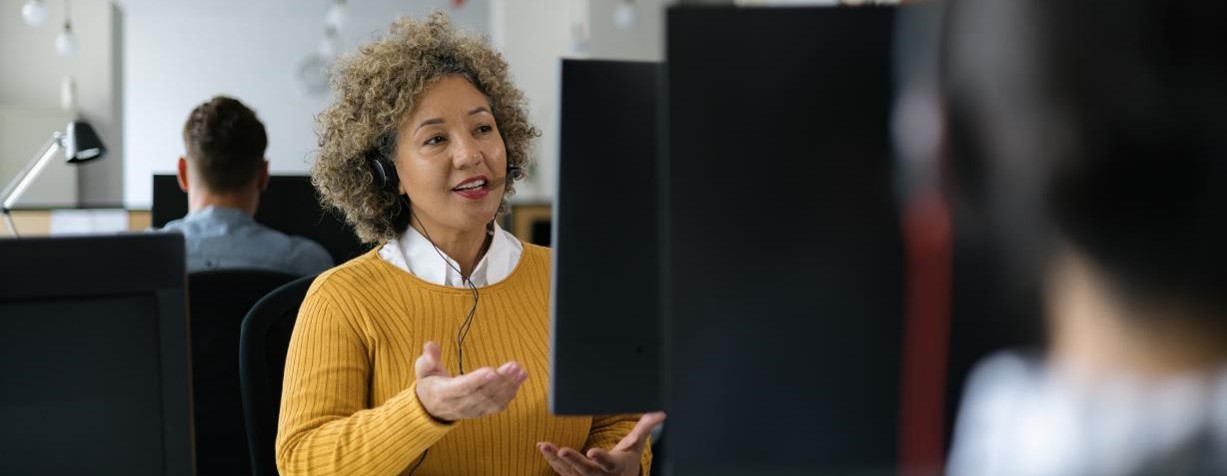How to Become a Call Handler
Discover how to start a career as a Call Handler, including the skills and personal qualities required, relevant qualifications, and progression routes within the field.

Overview of the Call Handler Role
A Call Handler is the first point of contact for patients requiring medical advice or assistance. They are tasked with taking detailed information from callers, assessing situations, speaking calmly to callers, and directing the call to the appropriate person.
Call Handlers must be able to make quick decisions under pressure and stay calm. Stress management is essential for this role, as are strong decision-making capabilities to assess the urgency of a situation and act accordingly.
If you think you might be looking for something similar, there are also other office jobs available with Blue Arrow.

Call Handler Dress Code
Call Handlers will typically dress in “smart casual” attire. This includes clothing such as collared shirts, smart blouses, black pants, dresses, jumpers and cardigans. Comfortable closed-toe shoes are also recommended.
Necessary Cashier Skills
Call Handlers must be calm under pressure, be able to think quickly while assessing the situation, and must have a good understanding of call handling systems and protocols.
Calmness Under Pressure
In a serious situation which may involve the emergency services, not all callers will be calm or coherent. It is the job of a Call Handler to stay calm while listening to a caller and gathering information. A Call Handler should be able to speak appropriately and reassure the caller if necessary.
The Call Handler role requires excellent communication and listening skills, as well as the ability to think critically while under pressure, to do all of this, it is extremely important to stay calm and level-headed.
Quick Thinking
When taking in information, a Call Handler must understand the situation and know which emergency services are the most appropriate for the job. This requires quick thinking, as it is never certain how serious a situation might be and must be addressed with the appropriate amount of urgency.
Call Handlers must not become flustered or overwhelmed while taking calls and must adapt to whatever situation they are presented with.
Knowledge of Call-Handling Systems & Protocols
It is important to learn which call-handling systems and protocols are best suited to your work and how to use them effectively. This will be shown during on-the-job training and will continue to be used as the Call Handler gains experience.
Understanding systems and protocols will make dealing with a situation easier for both the caller and the Call Handler, which is important for quick response times.
Recording information is vital, so gaining experience and knowledge of these systems and protocols is important for all Call Handlers.
Duties of a Call Handler
A Call Handler must be able to manage calls effectively, record accurate information from callers, and liaise with the appropriate response teams when necessary.
Managing Calls
Managing calls efficiently is essential to the job, Call Handlers should answer promptly when they receive a call and be polite and understanding to the needs of the caller.
It is important to actively listen, provide accurate information and obtain the necessary information to make quick decisions. Communication is key so that the call is concluded with the correct solution.
Recording Accurate Information
When it comes to recording information, it is important to ask for as much key information as necessary to make the correct decision. There will be lots of questions to ask, many of which may be covered in the appropriate script provided by the employer. Experienced Call Handlers will know which questions are the most appropriate and important to ask.
Call Handlers are also tasked with recording all the information they receive so that it can be passed over to whichever service is being requested, as they will also need a detailed report of the situation.
Liaising with Response Teams
Once the situation is assessed and a decision has been made a Call Handler must then relay the information to the appropriate response team or emergency services. It is important to make sure all the recorded information is both detailed and correct before passing it on.
Call Handlers also need to be able to communicate appropriately with response teams in these situations and continue to stay calm and professional.
Call Handler Career Progression
Progression from the Call Handler role can go in several directions, such as Supervisor and Management roles, or specialising in Emergency Services or Healthcare Support.
Supervisor & Management Roles
To progress into a Supervisor or Management role, it is important to demonstrate and develop leadership capabilities by mentoring others and finding opportunities to take on additional responsibilities.
There is also the potential to pursue relevant training or certification if and when it is available.
Specialising in Emergency Services/Healthcare Support
This specialised area primarily focuses on taking emergency calls from the public. Much like a Call Handler, this requires exceptional communication and problem-solving skills, as well as continued improvement in time management and quick thinking.

As this role is dedicated to emergency services it is the first point of call for individuals experiencing medical crises and therefore requires an extensive amount of experience working well under pressure.
FAQs on Becoming a Call Handler
Do I Need Qualifications to Become a Call Handler?
While there are no strict formal qualifications required, employees will look for candidates with a good standard of education including GCSE Maths and English, and experience in customer service or a similar role.
How Do Call Handlers Manage Stressful Situations?
Call Handlers may need to adopt breathing techniques or take regular breaks to handle stress. Learning how to stay calm in stressful situations is also an acquired skill that will be learned through experience.
What Shifts Do Call Handlers Generally Work?
Call Handlers will typically work rotating shifts covering a 24/7 schedule including mornings, afternoons, evenings and night shifts. Shift times can vary, including a mix of 12-hour shifts.
Accordion summary...
Accordion body...


